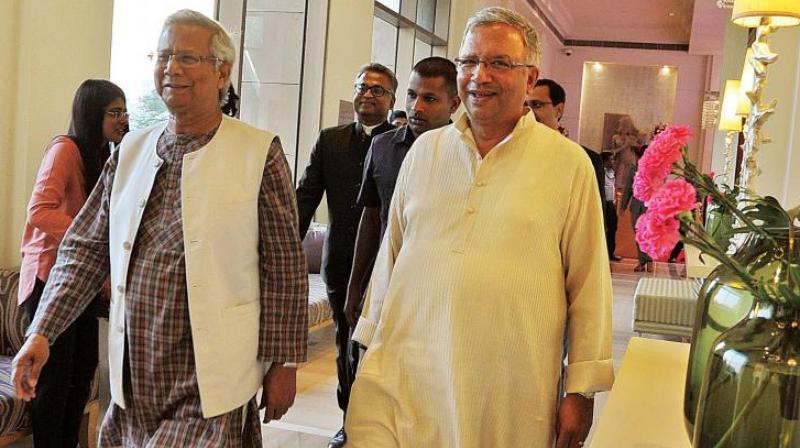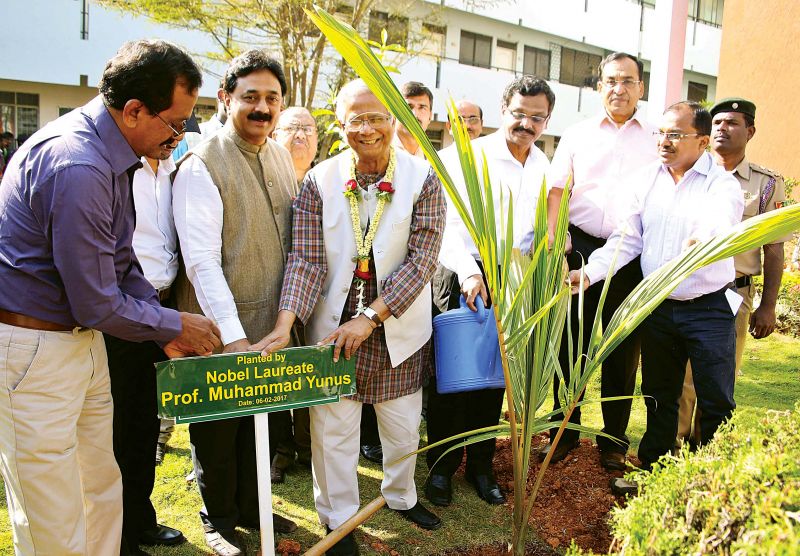From micro to macro, leap of faith for Ujjivan
Monday marked an important milestone in Ujjivan's journey, as they launched Ujjivan small finance bank operations.

Bengaluru: When Samit Ghosh, the MD and CEO of Ujjivan Financial Services, decided to turn his back on a lucrative banking career, one that spanned over three decades of working with top foreign banks and dealing with high-net-worth individuals,he found himself faced with a good deal of scepticism.
"I wasn't convinced when Samit first told me about his plans back in 2003. He had a wealth of experience, of course, but none of it was related to micro-finance in any way," said K.R. Ramamoorthy, who has been on the Board of Directors of the path-breaking micro-finance concern since it was founded in 2005. “It was his trip to Bangladesh that really clinched it, his enthusiasm contagious enough to bring me on board too!"” In Bangladesh, Ghosh met the man who would become his greatest inspiration – Nobel prize-winning economist Professor Muhammad Yunus, the pioneer of micro-finance and the man who single-handedly lifted a nation out of decades of poverty.
 A dance performance at the launch of Ujjivan Bank at Seshadripuram College, in Bengaluru on Monday. (Photo: Shashidhar B)
A dance performance at the launch of Ujjivan Bank at Seshadripuram College, in Bengaluru on Monday. (Photo: Shashidhar B)
Monday marked an important milestone in Ujjivan's journey, as they launched Ujjivan small finance bank operations, making them the first micro-finance bank in the country. Top bankers, financial experts and leading intellectuals from across India were all in attendance as Samit Ghosh and Professor Yunus flagged off its operations at five centers across Bengaluru. This marks the culmination of a ten-year journey for Ujjivan, which started out back in 2005 with the aim of bringing about financial inclusion across sectors.
Yunus touch changed Ujjivan
Being brought within the framework of the banking system is an achievement, although this is the start of a brand-new journey. Both Professor Yunus and Ghosh concurred over the fact that Ujjivan is now in completely unmarked territory. "This is largely due to policy," said Professor Yunus. "Micro-finance institutions are awarded something of a Dalit status, they're not brought into the mainstream framework of the banking laws. These laws currently support banking for the rich." His own efforts to include micro-finance institutions within the larger fabric of the law have largely gone in vain, Professor Yunus recounted. "I'm very glad India has taken the first step by granting Ujjivan a license. This is their turning point, however. They will have to deal with the issue of identity - do they stick to the identity with which they began, or become part of a larger culture?"
The years that followed Ujjivan's application to the RBI for a banking license were marked by relentless research. The sector had not been ventured into and to do so would mean establishing a sustainable, long-term vision. "We had to start with what micro-finance is all about?" Ghosh remarked. "We have been trying to figure out market research, economic distribution, products, services and collaborating with technology partners. We have been driving ourselves crazy trying to figure out what to do!"
 Nobel laureate Muhammad Yunus plants a sapling at Seshadripuram College in Bengaluru on Monday. (Photo: DC)
Nobel laureate Muhammad Yunus plants a sapling at Seshadripuram College in Bengaluru on Monday. (Photo: DC)
It is vital, said Professor Yunus, that Ujjivan holds on to its identity as a "mission-driven" bank. "The aim has always been to bring about financial inclusivity," he said. "If you lose that, you will become part of the larger fabric of small finance banks." Being brought into the legal framework, he said, is Ujjivan's opportunity to ensure that its services are more far-reaching and impactful than ever before.
Holding on to their mission isn't too big a leap for Samit Ghosh's Ujjivan, however The institution has, since its founding, worked alongside Parinaam, the organisation founded by Samit's wife, Elaine. The two organisations function hand-in-hand, driven by the belief that financial inclusion cannot happen without financial literacy. Now headed by the talented daughter, Mallika Ghosh, the Parinaam Foundation works with the urban poor as it helps bring about financial inclusion among the masses of slum-dwellers and daily-wage labourers who reside in our cities.
Ujjivan has also been repeatedly named in the top three of the top 25 places to work in India, with over 10,000 employees across the country. With ten-years of work already behind them, a stream of loyal supporters and the inspiration he received from the visionary Professor Yunus, Samit Ghosh has taken the first step in a long and arduous journey toward changing India's financial landscape.

